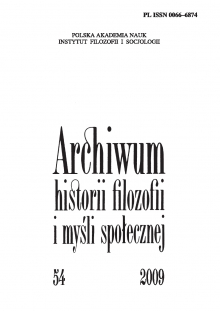Unde malum? Zagadnienie zła w filozofii Luigiego Pareysona i jego współczesne interpretacje
Unde Malum? The Problem of Evil in the Philosophy of Luigi Pareyson and its Contemporary Interpretations
Author(s): Mikołaj SokołowskiSubject(s): Philosophy, Transformation Period (1990 - 2010)
Published by: Instytut Filozofii i Socjologii Polskiej Akademii Nauk
Keywords: Payerson; zło; cierpienie; filozofia religii; religia;
Summary/Abstract: Mikołaj Sokołowski in the article „Unde malum? Zagadnienie zła w filozofii Luigiego Pareysona i jego współczesne interpretacje” [Unde Malum? The Problem of Evil in the Philosophy of Luigi Pareyson and its Contemporary Interpretations] focuses on the most important work of the Italian philosopher – Pareyson – which remains his posthumous Ontologia della libertà. Il male e la sofferenza [Ontology of Freedom. Evil and Sufferance] published in 1995. According to the author the visible shift of the approach to the Pareyson’s philosophy came into light after 2001 World Trade Center terroristic assault. In the writings of such researchers as Sergio Givone, Franco Rella, Francesco Tomatis, Giovanni Ferretti, Marianna Gensabella Furnari, Roselena Di Napoli, Rosaria Longo and Antonio Stevenazzi we can differentiate two strands. There are the defenders of a thesis of irrational and not representational essence of evil in the philosophy of Turiner (Rella, Stevenazzi) and there are the supporters of quite different statement: Givone, Gensabella Furnari, Di Napoli, Longo see it as a systematic-dialectical phenomenon. Sokołowski points out that the participants of both “schools of interpretation” tried to free the philosophy of Pareyson from a potential criticism which consists in a historical approach to evil. Sharing the point of view on evil as historical phenomenon, the author agrees that Pareyson’s interpretation of evil is not its justification but an explication of its role in history. The author connects a phenomenon of evil in the philosophy of Pareyson with his definition of “persona” to convince us that according to this theory every sufferance, i.e. every victim is unrepeatable, unique and so tragic as all other victims.
Journal: Archiwum Historii Filozofii i Myśli Społecznej
- Issue Year: 54/2009
- Issue No: 54
- Page Range: 99-120
- Page Count: 22
- Language: Polish

